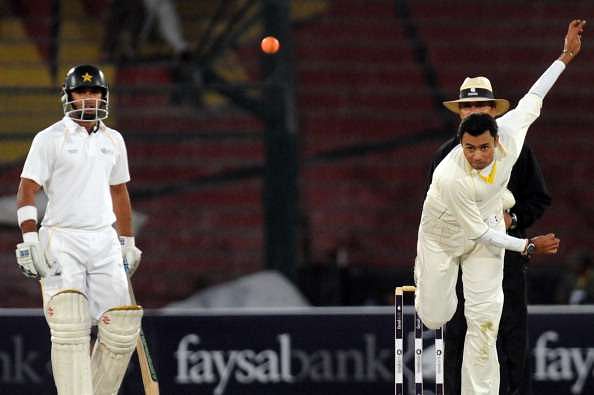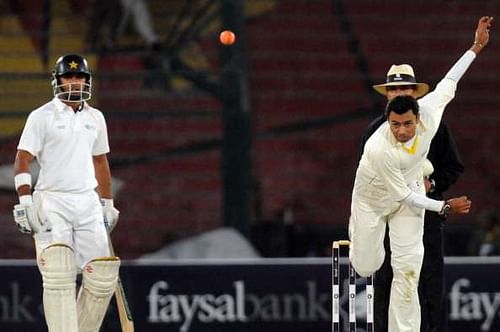
Pakistan has discriminated against me, claims Danish Kaneria
Danish Kaneria has lashed out at the authorities in control of Pakistan cricket and blamed them for destroying his career in an interview with India Today. The discarded leggie is currently in India on a ‘spiritual’ trip also rubbished rumors that his purpose of visiting the country is to seek asylum here.
Danish Kaneria, who stands 4th on the list of highest wicket-takers for Pakistan in Tests, was banned by the English Cricket Board in 2012 for his alleged involvement in spot-fixing. Kaneria was identified as the player by Mervyn Westfield who approached him to engage in spot-fixing when Westfield stood on trial for spot-fixing charges. Kaneria appealed to ECB to lift the lifetime ban but his appeal was rejected. Kaneria then sought help from Pakistan Cricket Board and much to his surprise was shown the back by them as well.
Talking about the trial that ended with Mervyn Westfield walking scot free and a ban being imposed on the leg spinner, Kaneria said, "The trial was launched two years after the Scotland Yard cleared me. It was biased against me, since they (ECB) seemed to have struck a deal with Westfield to protect him."
Kaneria adds, "During the trial, when I told them that my father was suffering from cancer, the ECB attorney said 'we don't care whether your father lives or dies.' Such was their attitude.”
"The PCB toed the line of ECB, and banned me too. Ironically, the (in)famous spot-fixing scandal of 2010 in England came after I was pulled out of the Pakistan team at ECB's insistence, despite having provided the PCB all documents to prove my innocence. Salman Butt, Mohammad Asif and Mohammad Aamir were supposed to be the ambassadors of the game, but look at what they did," he says, while slamming the move to end the bans of the trio.
Only the second Hindu to play for Pakistan after wicket-keeper Anil Dalpat, Kaneria in an interview expressed his frustration at not receiving any attention from Pakistan authorities despite his repeated efforts to reach out to them. “I have to use the word discrimination again and again because of the treatment meted out to me by the PCB. People of Pakistan have given me a lot of love but it is because of those few people in the PCB that I feel that I am being punished for being a player from the minority community in Pakistan,” said the leggie.
Also Read: Pakistan leg-spinner Danish Kaneria accuses ECB of racism
"I have appealed through every forum in Pakistan. I gave 10 years of my life to the PCB but they left me when I needed them the most. My case was crystal clear, there was no hard or soft evidence against me. England cricket board forced a ban on me and PCB didn't say a word. ECB is dictating things to PCB. The ban put on me was absolutely baseless and allegations were made by someone who was himself a convict. It was just based on hearsay."
Kaneria also highlighted the difference in the treatment that was meted out to him and left-arm pacer Mohammad Amir, who is now on a comeback trail in both forms of the game after serving his five-year ban, “Pakistan Cricket Board went out of its way for (Mohammad) Amir but look what are they doing to me. They don't want to even talk to me. I keep asking myself that am I being neglected because I am a Hindu?"
Kaneria had 261 Test scalps when he went out of the picture for Pakistan Cricket. The bowler says that had his career not been brought to halt by the board, he could have gone on to achieve greater things with his leg breaks. "At the speed with which I was going at that point of time, I would have easily crossed the 500-wicket mark in Test cricket by now. Just have a look at the records I broke of (Abdul) Qadir sahab, Mushi (Mushtaq Ahmed) and Saqi (Saqlain Mushtaq) bhai. I am still the fourth highest wicket-taker for Pakistan after Wasim, Waqar and Imran. I could've broken their records too but was stopped. PCB is responsible for it."
When asked about the rumors doing the rounds about him turning to India for asylum, he cleared the air by saying, "This is such loose talk. I've received so much love in Pakistan, it is just that the PCB has discriminated against me. If I wanted to seek asylum here, why would I leave my kids behind in Karachi. I've come here with my mother and wife,"
